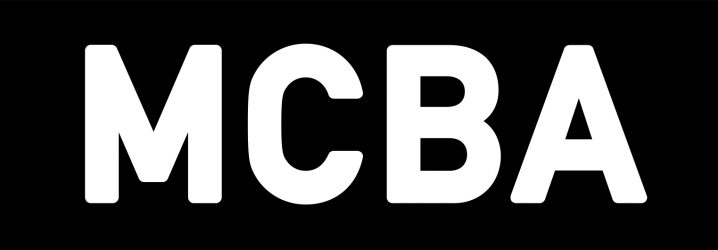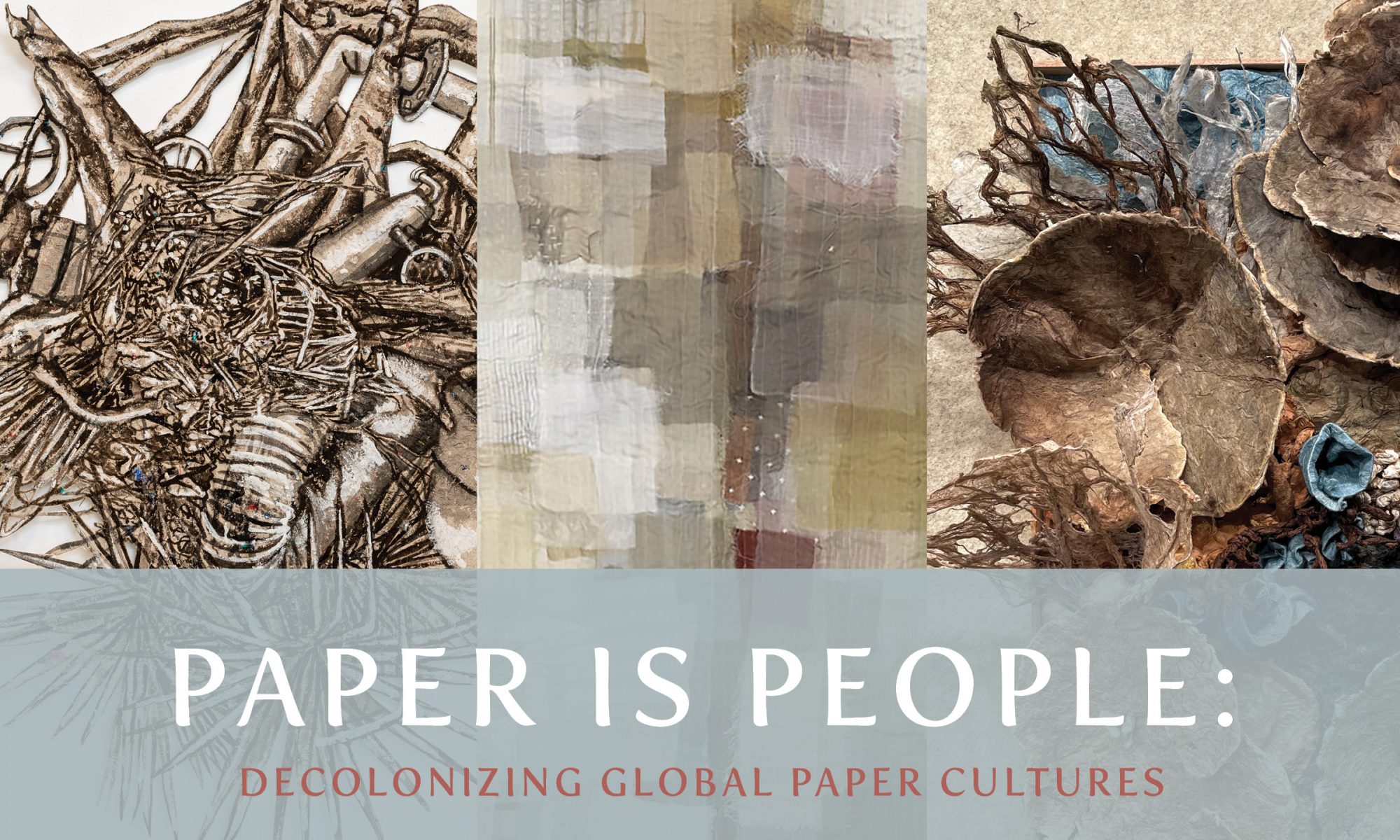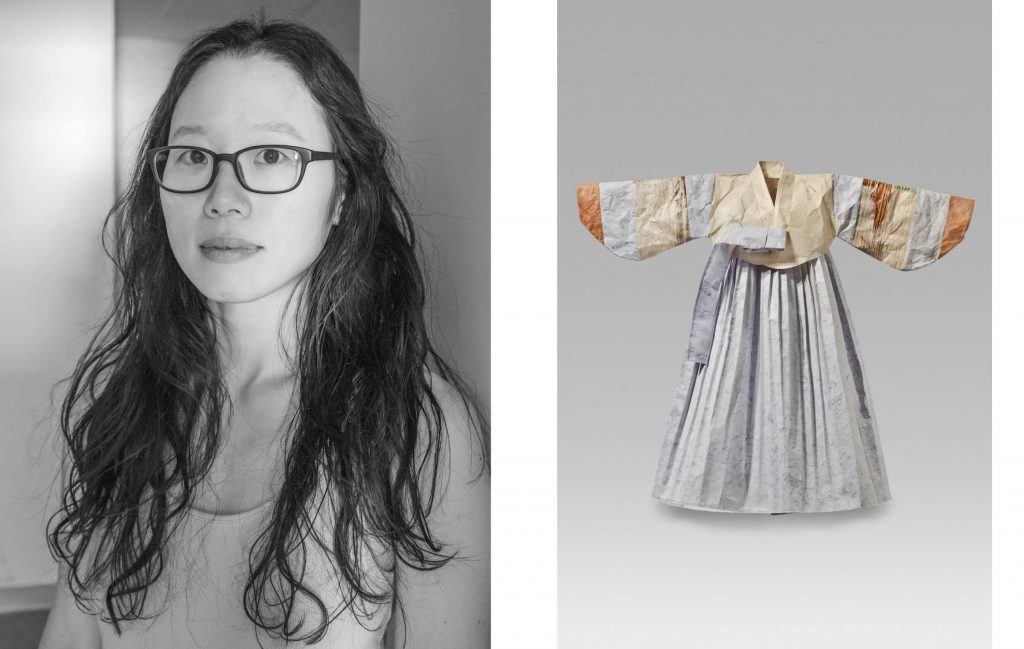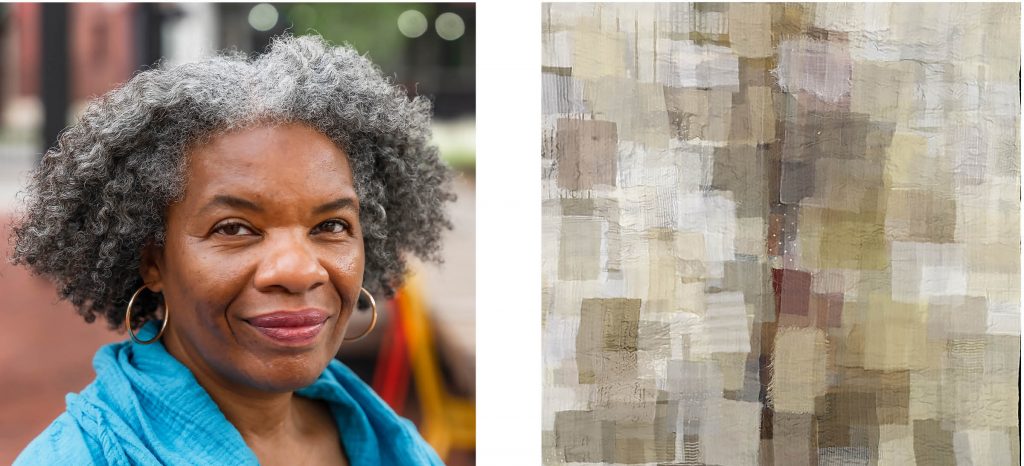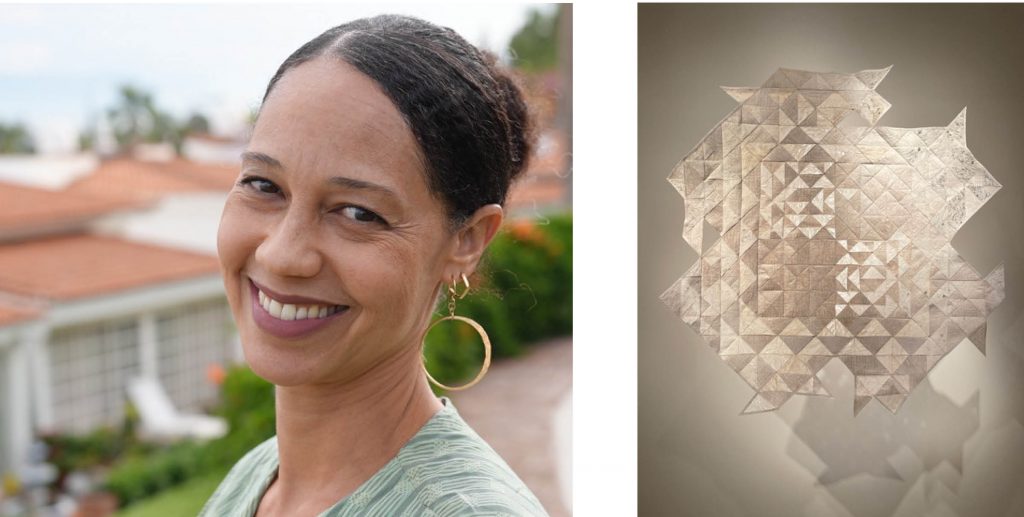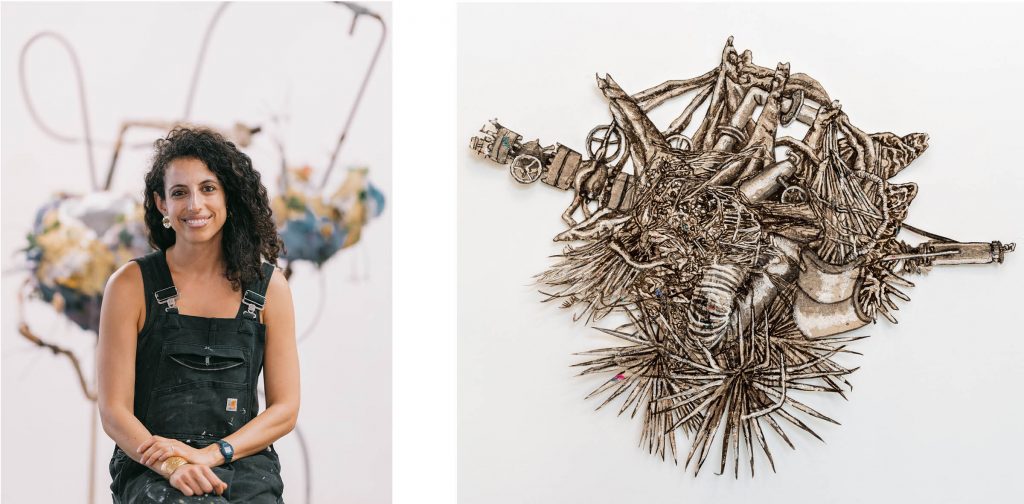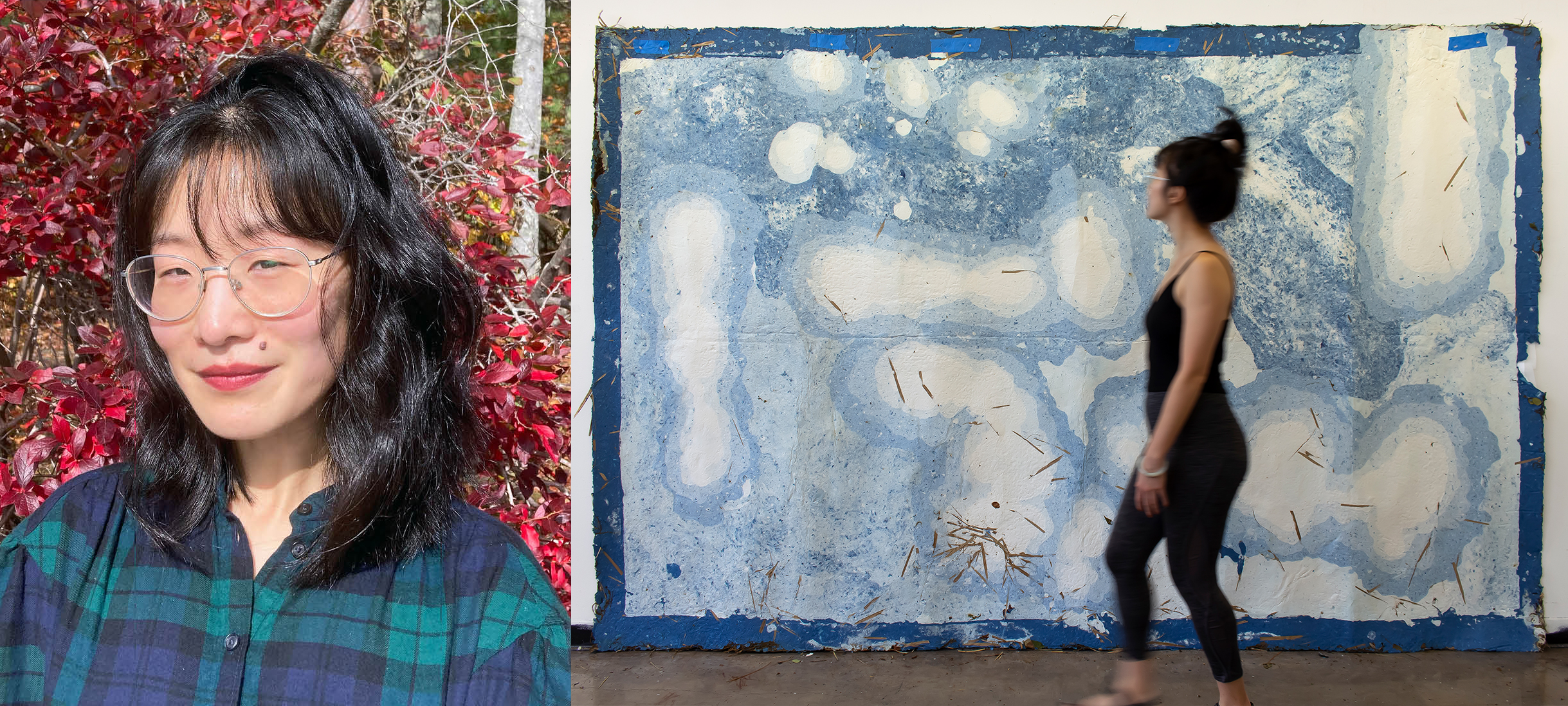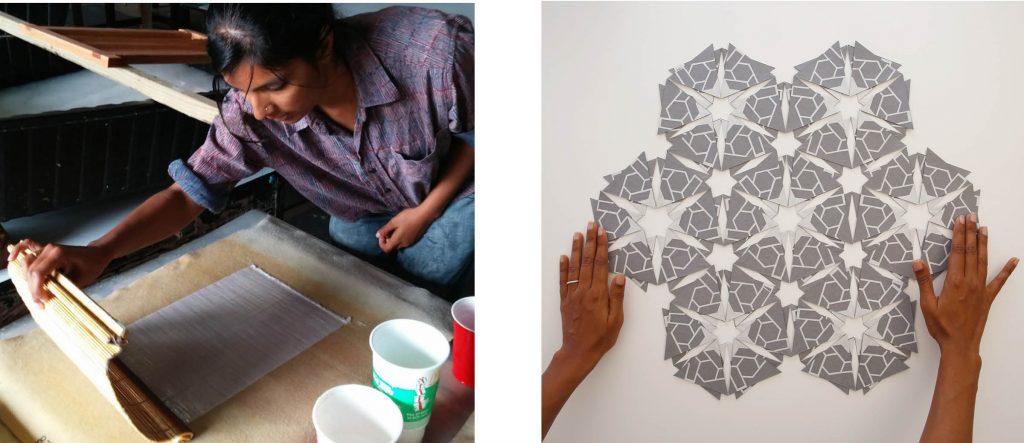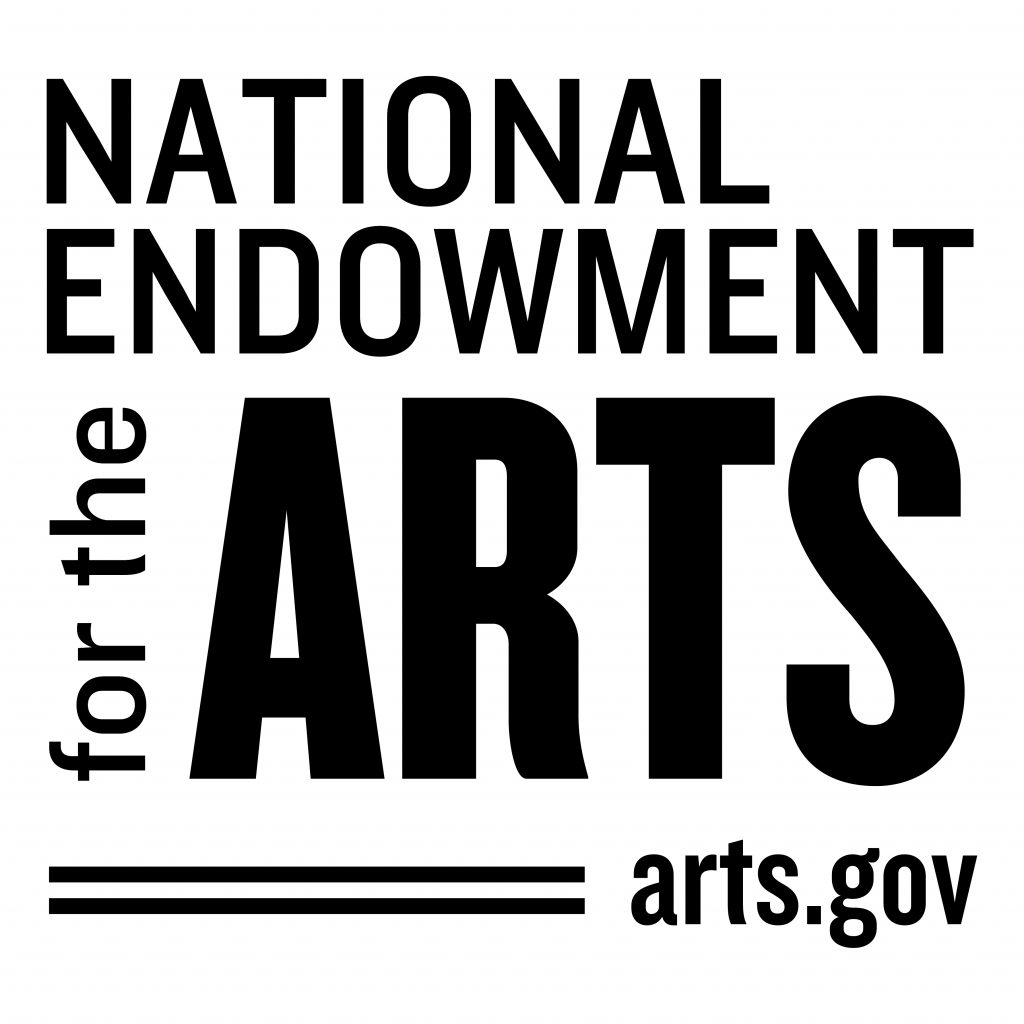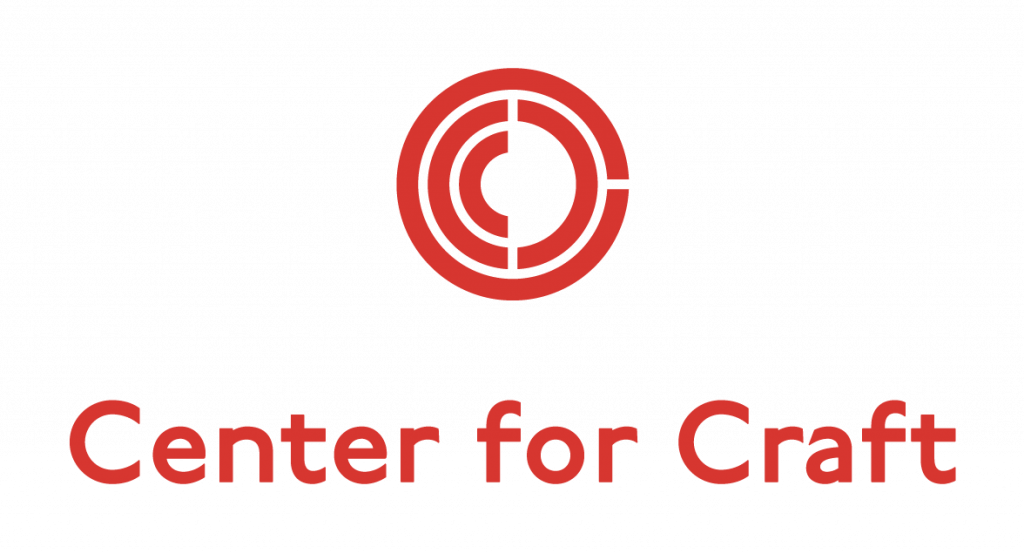MCBA Main Gallery
April 14 – August 12, 2023
Reception: Thursday, June 22, 7–9pm
Free and open to the public
Paper Is People: Decolonizing Global Paper Cultures, co-curated by Tia Blassingame and Stephanie Sauer, offers a new definition of paper within a global and decolonial framework. Featuring works by local, national, and international artists, this exhibition explores the vital role substrates play in human communities and how meaning is made from what we might call paper and papermaking.
Viewed together, the works on display seek to open a conversation around what paper is across cultures today: a vessel for collective memory, a body, a site of meaning, a living ancestor, and a form of cultural survival and resistance. Our ideas about paper are linked to how we value traditions of language, knowledge production, creative expression, storytelling, and history. Many of us think of paper as thin sheets fashioned from fibrous pulp, but this understanding leans heavily on European applications and usage, with its roots in ancient Chinese technology and centuries of violent occupation, enslavement, and trade.
In the Indigenous and oral cultures represented here, baskets, tapestries, and other handmade substrates act as vessels and embodiments of culture and memory.
To appreciate global paper cultures in a decolonial context, it is important to consider definitions of paper that move beyond those created and sanctioned by imperial powers. In the Indigenous and oral cultures represented here, baskets, tapestries, and other handmade substrates act as vessels and embodiments of culture and memory. Some even hold status as animate members of their community. Among peoples subjugated under slavery and denied access to literacy and the requisite tools for creating paper and books, maintaining and building upon their threatened cultural knowledge required creativity like the kind exhibited in African American quilts. Paper Is People presents each cultural substrate as a new definition within contextualized, multimedia displays that invite thoughtful participation and engagement of the senses. Visitors will have the opportunity to see paper samples, handle source materials, watch papermaking processes from source to finish, hear first-hand accounts from traditional practitioners, experience how contemporary artists are finding new applications for ancient technologies, and participate in a variety of workshops and talks.
Exhibiting artists include Alisa Banks, Hannah Chalew, Page Chang, Julio Laja Chichicaxtle, Kelly Church, Hong Hong, Chenta Laury, Aimee Lee, Radha Pandey, the Seringô Collective, and Skye Tafoya.
After premiering at Minnesota Center for Book Arts, Paper Is People will be available to travel beginning in late August, 2023.
Paper Is People Workshops
All skill levels are welcome to join these special visiting artists for workshops that pair traditional methodologies with contemporary sensibilities.
Indo-Islamic Papermaking
Virtual with Radha Pandey
Saturday, June 3; 10:30am–12pm
Vietnamese Papermaking
In-person with Veronica Pham
Saturday, June 17; 10am–4pm and Sunday, June 18; 1–4pm CT
Ink-Making from Ecology: Grounded in Place
In-person with Hannah Chalew
Saturday, June 24; 10am–4pm CT
Sustainable Papermaking with Repurposed Paper and Plastic
In-person with Hannah Chalew
Sunday, June 25; 10am–4pm CT
Artist Panel: Paper Is People
Virtual, moderated by Tia Blassingame and Stephanie Sauer
Tuesday, July 18; 6–7:30pm CT
Additional Papermaking Workshops
Indigo Dye for Papermakers and Fiber Artists
In-person with Heather Kohlmeier
Saturday, July 22; 10am–4pm CT and Saturday, July 29; 1–4pm CT
Imagery In, On, and Of Paper
In-person with Bridget O’Malley
Saturdays: August 12 & 19; 10am–4pm CT
Select Exhibiting Artists
AIMEE LEE is an artist who makes paper, writes, and advocates for Korean papermaking practices. Designated as an Ohio Arts Council Heritage Fellow, she is a two-time Fulbright scholar to Korea, where she learned about making hanji, its applications, and its tools, and has studied with various Korean national and provincial holders of intangible cultural heritage since 2009. Her research is embodied in her artwork, teaching, and practice at her dedicated hanji studio in South Euclid, Ohio.
ALISA BANKS (she/her) is a visual artist based in Dallas, Texas who investigates connections to contemporary culture, her Creole heritage, and the African diaspora through the lenses of home, terrain, and the body, using Southern Louisiana as a point of entry. Her sculptural artist books, mixed media work, and textile collages, often incorporate fibers and found materials and reference traditional craft forms. Alisa’s work has been exhibited in internationally, and is housed in private and public collections, including the Smithsonian Institution, the US Library of Congress, and The British Library.
Originally from O’ahu, CHENTA LAURY is a Maui-based artist and educator. She has exhibited in shows throughout the country and her work is held in numerous private collections, including the Four Seasons Hotels & Resorts, as well as in the Hawai’i State Art Museum in Honolulu. Chenta received an undergraduate degree in studio art and art history from Oberlin College, a Masters from Harvard University, and a Certificate in Applied Arts from the Fiber Crafts Studio in Chestnut Ridge, NY. Chenta’s recent work straddles the lines between craft and fine art, representational, abstract, and conceptual vocabularies, and merges artistic traditions related to her biological origins: patchwork quilting (African-American) and felting (Finnish), with tapa (barkcloth) and artistic traditions from Hawai`i.
HANNAH CHALEW is an artist, educator and environmental activist raised and currently working in New Orleans. Her artwork explores what it means to live in a time of global warming with a collective uncertain future, and specifically what that means for those living in Southern Louisiana. Chalew’s practice explores the historical legacies that got us here to help imagine new possibilities for a livable future. She received her BA from Brandeis University in 2009, and her MFA from the Cranbrook Academy of Art in 2016. Chalew has exhibited widely around the U.S. Her work has been featured in Garden & Gun, BOMB, Hyperallergic, Burnaway, the LA Times, the Boston Globe and more. Chalew’s work is included in two creative atlases by writer and activist Rebecca Solnit, Unfathomable City: A New Orleans Atlas, co-authored with Rebecca Snedeker and Nonstop Metropolis: A New York City Atlas, co-authored with Joshua Jelly-Schapiro. She is the 2022 South Arts Southern Prize winner as well as the South Arts Louisiana State Fellow.
Born in Hefei, Anhui, China, HONG HONG (she/hers) earned a BFA from State University of New York at Potsdam and MFA from University of Georgia. Since 2015, she has traveled to faraway and distinct locations to create site-responsive, monumental paper-works. In this nomadic practice, ancestral methods of Chinese paper-making coalesce with painting and monastic rituals. Recent projects map interstitial relationships between exile, landscape and the Chinese Diaspora through cartographic, symbolic, temporal and material languages. Hong is the recipient of a United States Artist Fellowship (2023), a Carnegie Foundation Fellowship at MacDowell (2020), a Helen Frankenthaler Foundation Fellowship at Vermont Studio Center (2019), an Artistic Excellence Fellowship from the Connecticut Office of Arts (2019), and a Creation of New Work Grant from the Edward C. And Ann T. Roberts Foundation (2018 – 2019). She currently lives and works in Massachusetts.
RADHA PANDEY is a papermaker and letterpress printer. She earned her MFA in Book Arts from the University of Iowa Center for the Book. She specializes in Indo-Islamic Papermaking and teaches book arts classes in India, Europe and the US. Her book, Anatomia Botanica, won the MICA Book Award in 2014 and received an Honorable Mention at the 15th Carl Hertzog Award for Excellence in Book Design. In 2018, her book, Deep Time, won the Joshua Heller Memorial Award. Her books are held in over 80 collections internationally, including the Library of Congress and Yale University. Currently, Radha is working on an artist book inspired by Mughal floral portraiture from the 17th century, for which the paper will be made in the traditional Indo-Islamic style.
Curators
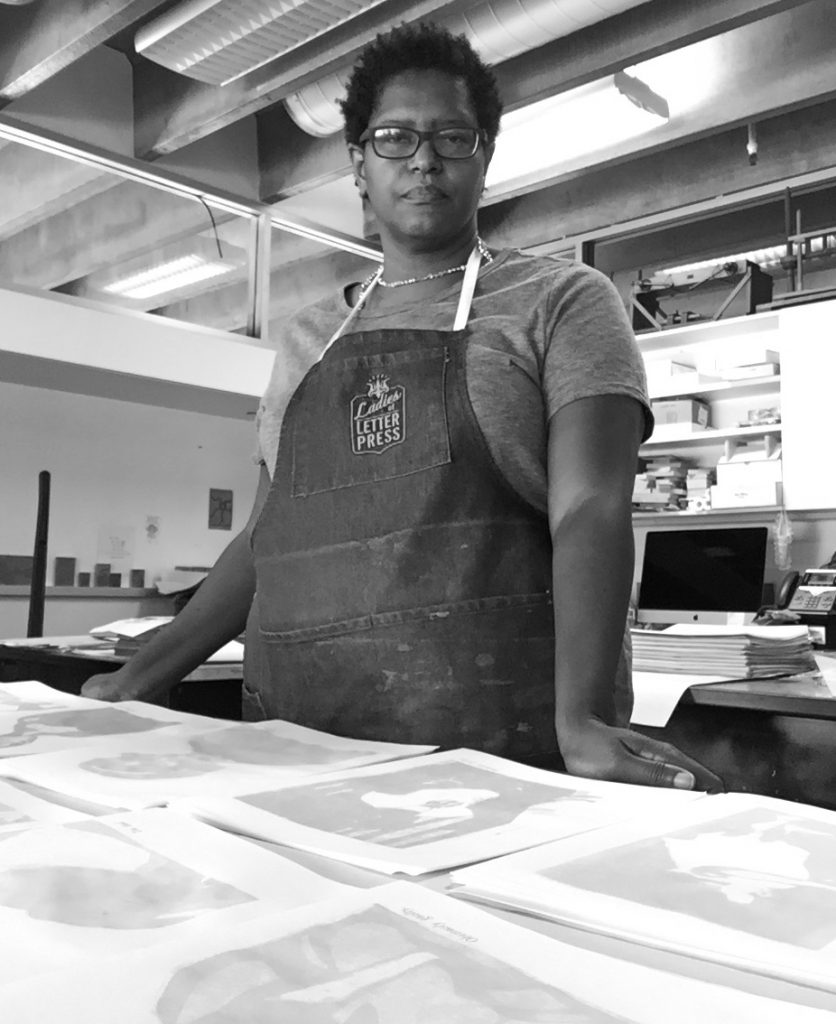 Employing book arts and printmaking techniques, TIA BLASSINGAME reconstructs charged images and histories for a nuanced discussion on issues of race and racism. She was a curatorial intern at Smithsonian Museum of American History, and served as the Image Coordinator for the Race & Ethnicity in Advertising–America: 1890-Today, an Advertising Education Foundation-Smithsonian Institution project. She has been an artist-in-residence at Yaddo, Santa Fe Art Institute (SFAI), the Andy Warhol Preserve, the International Print Center New York, and MacDowell. In 2019, Blassingame founded the Book/Print Artist/Scholar of Color collective to bring BIPOC book artists, papermakers, paper engineers, curators, letterpress printers, papercut artists, printmakers into conversation and collaboration with Book History and Print Culture scholars to build community and support systems. She recently co-curated the Troubling: artists’ books that enlighten and disrupt old ways of being and seeing exhibit at the Bainbridge Island Museum of Art with book artist/educator Ellen Sheffield. Blassingame is an Assistant Professor of Book Arts at Scripps College, and is the Director of Scripps College Press, a student, experimental bookbinding and letterpress laboratory.
Employing book arts and printmaking techniques, TIA BLASSINGAME reconstructs charged images and histories for a nuanced discussion on issues of race and racism. She was a curatorial intern at Smithsonian Museum of American History, and served as the Image Coordinator for the Race & Ethnicity in Advertising–America: 1890-Today, an Advertising Education Foundation-Smithsonian Institution project. She has been an artist-in-residence at Yaddo, Santa Fe Art Institute (SFAI), the Andy Warhol Preserve, the International Print Center New York, and MacDowell. In 2019, Blassingame founded the Book/Print Artist/Scholar of Color collective to bring BIPOC book artists, papermakers, paper engineers, curators, letterpress printers, papercut artists, printmakers into conversation and collaboration with Book History and Print Culture scholars to build community and support systems. She recently co-curated the Troubling: artists’ books that enlighten and disrupt old ways of being and seeing exhibit at the Bainbridge Island Museum of Art with book artist/educator Ellen Sheffield. Blassingame is an Assistant Professor of Book Arts at Scripps College, and is the Director of Scripps College Press, a student, experimental bookbinding and letterpress laboratory.
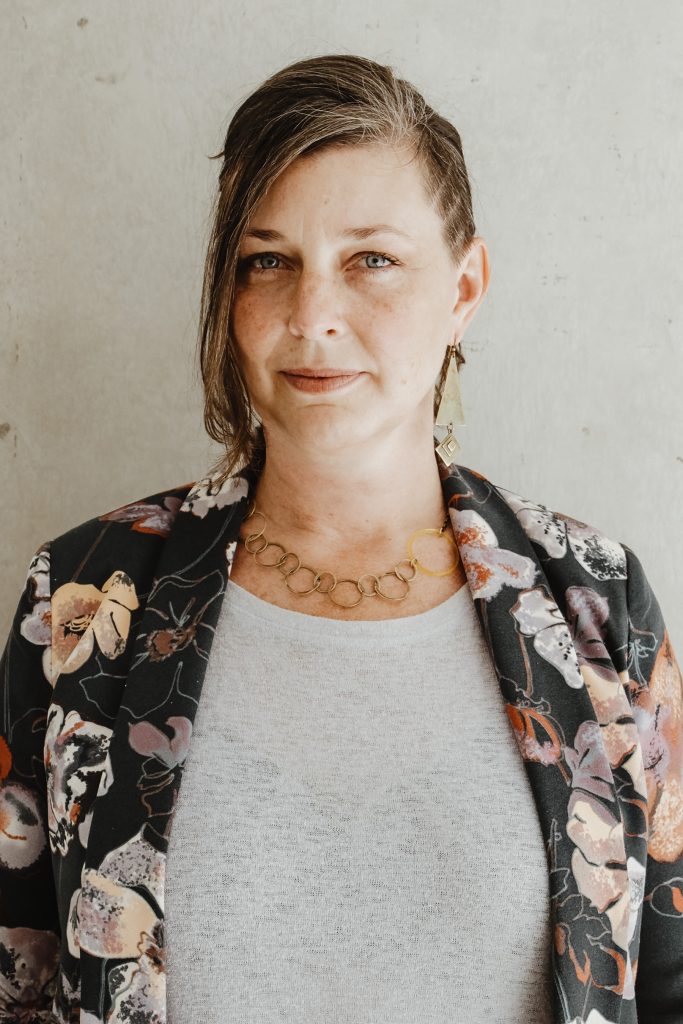 STEPHANIE SAUER is a writer, book artist, publisher, and author of Almonds Are Members of the Peach Family (Noemi Press) and The Accidental Archives of the Royal Chicano Air Force (University of Texas Press). Her book work has been exhibited at the De Young Museum, the Center for Book Arts, and the National Library of Baghdad. She is a co-founding editor of A Bolha Editora, an in-translation press headquartered in Brazil, the founding editor of Copilot press, a California-based press specializing in innovative Chicanx and queer editions, and a co-founder of Praça, Brazil’s first nationwide platform for small press and artist publishers. Recipient of So to Speak’s Hybrid Book Award, the Barbara Deming Memorial Award for Nonfiction, and fellowships from Yaddo, the Kimmel Harding Nelson Center for the Arts, the School of the Art Institute of Chicago, she currently teaches writing in Stetson University’s MFA of the Americas program and develops Lolmĕn Publications for the Shingle Springs Band of Miwok Indians.
STEPHANIE SAUER is a writer, book artist, publisher, and author of Almonds Are Members of the Peach Family (Noemi Press) and The Accidental Archives of the Royal Chicano Air Force (University of Texas Press). Her book work has been exhibited at the De Young Museum, the Center for Book Arts, and the National Library of Baghdad. She is a co-founding editor of A Bolha Editora, an in-translation press headquartered in Brazil, the founding editor of Copilot press, a California-based press specializing in innovative Chicanx and queer editions, and a co-founder of Praça, Brazil’s first nationwide platform for small press and artist publishers. Recipient of So to Speak’s Hybrid Book Award, the Barbara Deming Memorial Award for Nonfiction, and fellowships from Yaddo, the Kimmel Harding Nelson Center for the Arts, the School of the Art Institute of Chicago, she currently teaches writing in Stetson University’s MFA of the Americas program and develops Lolmĕn Publications for the Shingle Springs Band of Miwok Indians.
This project is supported in part by the National Endowment for the Arts. To find out more about how National Endowment for the Arts grants impact individuals and communities, visit www.arts.gov. This research was supported by a Craft Research Fund grant from the Center for Craft.
 This project is part of the Wakpa Triennial, presented by Public Art Saint Paul.
This project is part of the Wakpa Triennial, presented by Public Art Saint Paul.

